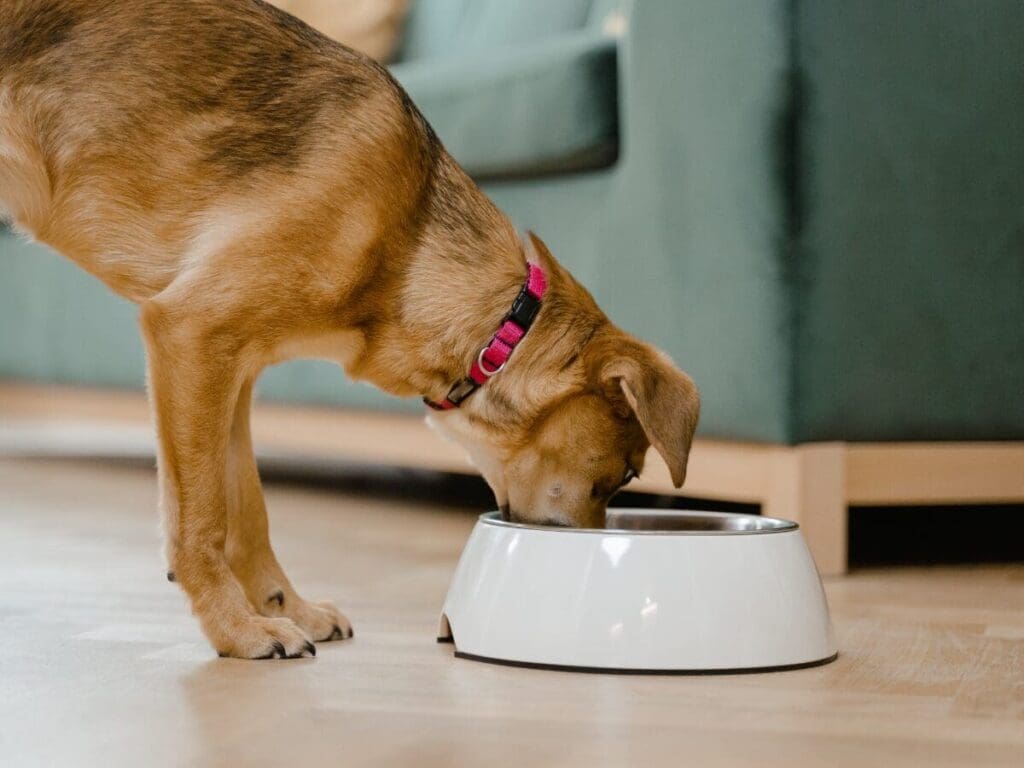Key Takeaways:
- Health Benefits: Incorporating mushrooms into your dog’s diet can boost their immune system, enhance cognitive function, and improve joint health.
- Safety Precautions: Always use safe types of mushrooms, cook them thoroughly, and start with small amounts to ensure your dog tolerates them well.
- Veterinary Consultation: Consult your veterinarian before adding mushrooms to your dog’s diet, especially if your dog has existing health conditions or is on medication.
At Happy Hemp, we pride ourselves on providing high-quality mushroom products designed to enhance natural wellness for both humans and pets. Our expertise in natural health solutions ensures that you can trust our advice on incorporating mushrooms into your dog’s diet.
Mushrooms have long been celebrated for their nutritional and medicinal properties in human diets, but did you know they can also benefit your furry friends? Incorporating mushrooms into your dog’s diet can provide various health benefits, from boosting immunity to supporting overall well-being. However, it’s crucial to understand which mushrooms are safe for dogs and how to use them properly to avoid any potential risks. In this article, we’ll explore the health benefits of mushrooms for dogs, safe types to use, potential risks, and tips for introducing them into your dog’s diet. By the end, you’ll have a comprehensive understanding of how mushrooms can be a valuable addition to your pet’s nutrition.
Health Benefits Of Mushrooms For Dogs
Mushrooms are packed with essential nutrients and bioactive compounds that can provide a variety of health benefits for dogs. Here are some key benefits of incorporating mushrooms into your dog’s diet:
Boosted Immune System
Mushrooms contain beta-glucans, which are known to enhance the immune system. These compounds stimulate the activity of white blood cells, helping your dog fend off infections and diseases more effectively. Regular consumption of beta-glucan-rich mushrooms can lead to a more resilient immune system, reducing the frequency and severity of common illnesses. This makes mushrooms particularly beneficial for dogs with weakened immune systems or those recovering from sickness.
Enhanced Cognitive Function
Certain mushrooms, like Lion’s Mane, are believed to support brain health. Lion’s Mane contains hericenones and erinacines, compounds that promote the production of nerve growth factor (NGF), which is essential for the growth and maintenance of neurons. By supporting brain function, these mushrooms can help improve memory and cognitive abilities in dogs, making them especially useful for aging dogs prone to cognitive decline. Regular use may help maintain your dog’s alertness and mental acuity.
Improved Energy Levels
The polysaccharides found in mushrooms, particularly beta-glucans, can help boost your dog’s energy levels. These complex carbohydrates provide a slow-release source of energy, ensuring your dog remains active and playful throughout the day. This sustained energy release can be particularly beneficial for working dogs, active breeds, or those recovering from illness or surgery, helping them regain strength and vitality more quickly.
Joint And Bone Health
Mushrooms such as Reishi have anti-inflammatory properties that can aid in reducing joint pain and improving overall mobility. Reishi mushrooms contain triterpenoids, compounds known for their ability to reduce inflammation and pain in joints. This can be particularly beneficial for older dogs or those suffering from conditions like arthritis.
By incorporating our mushroom-infused CBD products into their diet, you can further enhance your dog’s overall wellness. Our range includes gummies made from Reishi, Lion’s Mane, and Chaga mushrooms, which are known for their immune-boosting, cognitive-enhancing, and stress-managing properties. Explore our mushroom products today and help your furry friend live a happier, healthier life!
Safe Types Of Mushrooms For Dogs
Not all mushrooms are safe for dogs, so it’s important to know which types are beneficial and which should be avoided. Here are some mushrooms that are considered safe and beneficial for dogs:
Reishi (Ganoderma lucidum)
Known as the “Mushroom of Immortality,” Reishi mushrooms have been used in traditional medicine for centuries. They contain triterpenoids, polysaccharides, and peptidoglycans, which help boost the immune system, reduce inflammation, and promote overall health. Reishi is also known for its calming properties, making it great for dogs with anxiety or stress.
Shiitake (Lentinula edodes)
Shiitake mushrooms are rich in vitamins B and D, as well as minerals like zinc and selenium. They have been shown to enhance immune function and possess antimicrobial properties. Additionally, Shiitake mushrooms can help support cardiovascular health and improve circulation, benefiting dogs with heart conditions or those needing an immune boost.
Lion’s Mane (Hericium erinaceus)
Lion’s Mane mushrooms are renowned for their cognitive benefits due to compounds that stimulate nerve growth factor (NGF). These mushrooms support brain health, potentially improving memory and learning in dogs. They are particularly beneficial for senior dogs or those showing signs of cognitive decline.

Turkey Tail (Trametes versicolor)
Turkey Tail mushrooms are rich in polysaccharopeptides, which are known to enhance the immune system. They have been extensively studied for their potential cancer-fighting properties. Incorporating Turkey Tail mushrooms into your dog’s diet can help support their immune system and potentially slow the progression of certain cancers.
Cordyceps (Cordyceps sinensis)
Cordyceps mushrooms are known for their energy-boosting properties. They help increase ATP production, which is the energy currency of cells. This can improve stamina and reduce fatigue in dogs, making Cordyceps an excellent supplement for active or working dogs.
Potential Risks And Precautions
While mushrooms can offer significant health benefits for dogs, it’s crucial to understand the potential risks and take necessary precautions to ensure your pet’s safety. Here are some important considerations:
Toxic Mushrooms
Not all mushrooms are safe for dogs. Wild mushrooms, in particular, can be extremely toxic and even fatal if ingested. It’s essential to prevent your dog from consuming any wild mushrooms during walks or outdoor activities. Common toxic mushrooms include Amanita phalloides (Death Cap) and Amanita muscaria (Fly Agaric).
Allergic Reactions
Just like humans, dogs can have allergic reactions to certain foods, including mushrooms. Symptoms of an allergic reaction can range from mild (itching, redness, digestive upset) to severe (difficulty breathing, swelling). If you notice any signs of an allergic reaction after introducing mushrooms to your dog’s diet, discontinue use immediately and consult your veterinarian.
Digestive Issues
Some dogs may experience digestive issues when first introduced to mushrooms, especially if given in large quantities. Symptoms can include diarrhea, vomiting, or stomach upset. Start with small amounts and gradually increase the dosage to allow your dog’s digestive system to adjust. Always monitor your dog for any adverse reactions.
Proper Preparation
It’s important to properly prepare mushrooms before feeding them to your dog. Raw mushrooms can be difficult to digest and may contain toxins. Cooking mushrooms helps break down these toxins and makes the nutrients more bioavailable. Ensure mushrooms are cooked thoroughly and served in small, manageable pieces.
Consulting A Veterinarian
Before introducing mushrooms into your dog’s diet, it’s always a good idea to consult with your veterinarian, especially if your dog has pre-existing health conditions or is on medication. Your vet can provide personalized advice and help you determine the appropriate types and amounts of mushrooms for your pet.
How To Safely Introduce Mushrooms Into Your Dog’s Diet
Introducing mushrooms into your dog’s diet should be done gradually and carefully to ensure they receive the benefits without experiencing any adverse reactions. Here are some steps to safely incorporate mushrooms into your dog’s meals:
Start With Small Amounts
Begin by adding a small amount of cooked mushrooms to your dog’s regular food. A good starting point is about a teaspoon of finely chopped mushrooms for small dogs and a tablespoon for larger dogs. Observe your dog for any signs of digestive upset or allergic reactions over the next 24 hours.
Choose The Right Mushrooms
Only use mushrooms that are known to be safe for dogs, such as Reishi, Shiitake, Lion’s Mane, Turkey Tail, and Cordyceps. Avoid wild mushrooms and any varieties that have not been confirmed safe for canine consumption.
Cook Thoroughly
Always cook mushrooms before feeding them to your dog. Cooking helps break down potentially harmful compounds and makes the nutrients more accessible. Avoid using any seasonings, oils, or additives that could be harmful to dogs.
Mix With Regular Food
Mix the cooked mushrooms with your dog’s regular food to make the new addition more palatable. Gradually increase the amount of mushrooms over time, keeping an eye on your dog’s health and digestive responses.
Monitor Your Dog’s Response
Watch for any changes in your dog’s behavior, energy levels, or physical condition. If your dog shows signs of digestive issues, allergic reactions, or discomfort, reduce the amount of mushrooms or discontinue use and consult your veterinarian.
Consider Supplements
If preparing fresh mushrooms is not feasible, consider using mushroom supplements designed specifically for dogs. These supplements are often available in powder or capsule form and can be easily added to your dog’s food. Ensure any supplements are from reputable sources and contain no harmful additives.
Recommended Dosages For Different Dog Sizes
Determining the correct dosage of mushrooms for your dog is crucial to ensuring they receive the benefits without any adverse effects. The appropriate dosage can vary based on your dog’s size, age, and health condition. Here’s a general guideline to help you get started:
- Small Dogs (Under 20 lbs): For small dogs, start with 1/4 to 1/2 teaspoon of finely chopped or powdered mushrooms per day. Gradually increase to about 1 teaspoon as your dog adjusts and shows no signs of adverse reactions. Always monitor for any digestive issues or allergic reactions.
- Medium Dogs (20-50 lbs): Medium-sized dogs can begin with 1/2 to 1 teaspoon of mushrooms per day. Over time, you can increase this amount to 1 to 2 teaspoons, depending on how well your dog tolerates the addition. Make sure to introduce the mushrooms gradually to avoid overwhelming their digestive system.
- Large Dogs (50-90 lbs): Large dogs can start with 1 to 2 teaspoons of mushrooms per day. As they become accustomed to the mushrooms, you can increase the dosage to 2 to 3 teaspoons daily. Keep a close watch on their reaction to the mushrooms, adjusting the dosage if any adverse effects are observed.
- Extra-Large Dogs (Over 90 lbs): For extra-large dogs, begin with 2 to 3 teaspoons of mushrooms per day. You can gradually increase the dosage to 3 to 4 teaspoons, ensuring to observe your dog’s health and digestive response closely. Adjust the dosage as necessary to avoid any negative reactions.
Tips for Adjusting Dosages
- Gradual Increase: Always start with the lower end of the dosage range and gradually increase the amount over a few weeks. This approach allows your dog’s digestive system to adapt and minimizes the risk of any adverse reactions.
- Observation: Pay close attention to your dog’s behavior, stool consistency, and overall health. If you notice any signs of digestive upset, reduce the dosage and consult your veterinarian if necessary.
- Veterinary Advice: Consult with your veterinarian before starting any new supplement regimen, especially if your dog has pre-existing health conditions or is on medication. Your vet can provide personalized dosage recommendations based on your dog’s specific needs.
By following these dosage guidelines, you can ensure that your dog receives the optimal amount of mushrooms to support their health and well-being.

Final Thoughts
Incorporating mushrooms into your dog’s diet can provide a range of health benefits, from boosting their immune system and cognitive function to improving energy levels and joint health. By choosing safe, beneficial mushrooms like Reishi, Shiitake, Lion’s Mane, Turkey Tail, and Cordyceps, you can enhance your dog’s overall well-being and contribute to a healthier, more vibrant life.
It is essential to start with small amounts, properly prepare the mushrooms, and monitor your dog’s response to ensure they tolerate them well. Consulting with your veterinarian before introducing any new supplement is always a wise step, particularly if your dog has existing health conditions or is on medication.
Enhancing your dog’s health naturally with mushrooms is not only possible but can also be a rewarding experience for both you and your furry friend. With the right knowledge and precautions, mushrooms can become a valuable addition to your dog’s nutritional regimen.
Read also:
- Lion’s Mane Benefits: How This Mushroom Enhances Brain Health
- Cordyceps Mushroom Benefits: Boosting Energy And Vitality
- Natural Anxiety Solutions: How Mushrooms Can Help Calm Your Mind
Frequently Asked Questions About Mushrooms For Dogs
Can dogs eat mushrooms from the grocery store?
Yes, dogs can safely eat mushrooms commonly found in grocery stores, such as button, cremini, portobello, and shiitake mushrooms. These should be cooked and served plain without any seasonings or additives.
What should i do if my dog eats a wild mushroom?
If your dog eats a wild mushroom, contact your veterinarian immediately. Try to bring a sample of the mushroom for identification, as this can help determine the best treatment.
What are the symptoms of mushroom poisoning in dogs?
Symptoms of mushroom poisoning in dogs include vomiting, diarrhea, drooling, weakness, jaundice, and ataxia. In severe cases, there may be neurological symptoms like seizures.
Can dogs eat mushroom soup?
It’s best to avoid giving dogs mushroom soup, as it often contains ingredients like garlic and onions, which are toxic to dogs. Additionally, soups are high in salt and dairy, which can cause digestive issues.
Can dogs eat mushrooms on pizza?
While a small piece of plain mushroom that falls off your pizza is generally safe, it’s important to avoid giving dogs mushrooms with pizza toppings like garlic, onions, or oils that are harmful to them.
Can mushroom supplements replace medications for dogs?
Mushroom supplements should not replace prescribed medications but can be used as a complementary therapy. Always consult with your veterinarian before starting any new supplement.
Sources:
- Gold, P. W. M. I. How Medicinal Mushrooms Can Help Your Dog Battle Cancer.
- FitzClemen, B. E. (2024). Functional Mushrooms for Companion Animals: Therapeutic Potential & Product Quality.
- Seljetun, K. O., & Kragstad, H. R. (2023). A retrospective evaluation of mushroom ingestions in 421 dogs in Norway (2011–2022). Veterinary Record Open, 10(1), e60.
- Feng, T., Hu, Z., Tong, Y., Yao, L., Zhuang, H., Zhu, X., … & Lu, J. (2020). Preparation and evaluation of mushroom (Lentinus edodes) and mealworm (Tenebrio molitor) as dog food attractant. Heliyon, 6(10).







